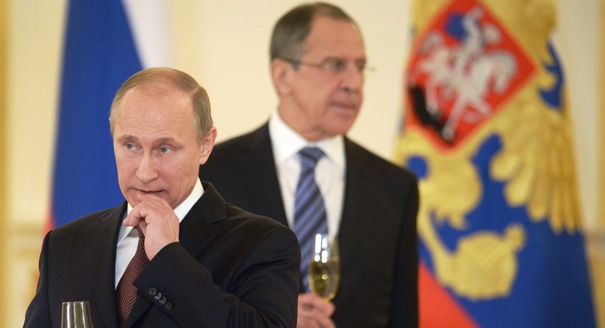The American Interest journal has just called Russia the world's top winner in 2013. President Vladimir Putin and Foreign Minister Sergey Lavrov have scored high points for staving off a U.S. military strike against Syria; preventing the European Union from reaching out to Ukraine via an Association Agreement; and profiting from the revelations of the fugitive NSA contractor Edward Snowden, whom Putin refused to extradite from Moscow.
The reality is more complex than this popular view. In fact, Putin helped President Barack Obama avoid an intervention which the U.S. president did not want and which would have probably made things worse for the United States in the Middle East and elsewhere. Moreover, Moscow's diplomatic intervention under the credible threat of U.S. strikes led to Syria's chemical disarmament, and the Geneva II conference, and the U.S. adoption of a gradualist approach toward Iran that Russia had long favored resulted in a breakthrough on the Iranian nuclear issue.
Putin's financial assistance to Ukraine allowed the European Union to avoid shouldering a responsibility for which the EU was not ready: having to bail out its new associate. As for Snowden, he had not been recruited by the Russians to begin with; he had started his revelations before arriving at Moscow's Sheremetyevo airport, and he only got stuck in Russia because the United States had been so successful in dissuading the Latin American leftist leaders from giving asylum to the whistleblower.
It needs to be added, of course, that what Russia did on Syria or Iran was not a gift to the United States, or the European Union. Moscow operates on its own agenda, but there is a significant overlap between Russian interests, even as the Kremlin sees them, and those of the Western countries.
What is more important is that in 2013 Russia's foreign policy has finally assumed a new quality, something which will probably last. From 2000 through 2011, Putin's foreign policy had gone through three phases. First came an attempt to construct an alliance with the United States and an integration mechanism with the EU (2000-2003); it was followed later by an effort to assert Russia's strategic independence from the West (2004-2008); and, finally, this was succeeded by new attempt at alignment with America and Europe (2009-2011). Putin's takeaway from all those years has been the conclusion that Russia should go its own way, building its own following and relating to all other great powers, including the United States, on an equal basis.
2012 was the pivotal year. Agreements, such as the Nunn-Lugar program of cooperative nuclear threat reduction, which saw Russia as a recipient of foreign assistance, were renegotiated or canceled. Sources of potential foreign political influence within Russia, such as the NGOs which received funding from abroad, were put under stringent control. Government officials were told to keep their financial assets in Russia, and declare the property that they owned abroad. Most fundamentally, Putin, previously famous for his non-ideological pragmatism, declared himself a convinced conservative. Much of this, to be sure, was in response to the domestic developments in Russia, but it clearly had international implications.
2013 has sealed these changes. Russia has made Eurasian integration a centerpiece of its foreign policy agenda, working consistently toward the signature of the Eurasian Union treaty this coming spring. Relations with the EU have assumed a new quality, even as they were downgraded. Moscow is no longer on the defensive about human rights; rather, it insists on its own views on the priority of values, and it is no longer shy to criticize its ex-mentor and ex-model.
Russia's relations with the United States have become strangely more contentious and more cooperative at the same time. Where the world views and values differ radically, their clashes are allowed to run virtually without hindrance. Where the interests meet, collaboration can be not only constructive, but productive. Thus, Snowden and Magnitsky, Syria and Iran can coexist in this compartmentalized environment. Bill Clinton's old adage about "walking and chewing gum at the same time" has become a reality—for both parties.
Russia has also started paying more attention to Asia and the Pacific, not just China. Putin's recent New Year address from the Russian Far East was also a geopolitical message. The crises in Syria and elsewhere helped Moscow's return to the Middle East, and the forthcoming departure of Western forces from Afghanistan will demand Moscow paying more attention to Central Asia. Finally, Russia has focused on its new northern facade, the Arctic. This makes Russia much more of an international player than ever before in the last quarter-century.
The challenges to Moscow's foreign policy are also rising. The country's economic situation is worrying. Even as its military power is being rebuilt, Russia's technological and scientific power is still wanting. Diplomatically, Eurasian integration will be particularly challenging. Will Moscow and its partners be able to create a voluntary and lasting union which will make sense economically and benefit the population of the member countries, building synergies among them while remaining open to the global economy, or will it succumb to protectionism, exclusivity and ever more authoritarian ways of governance? 2014 will give at least a hint at the answers.







